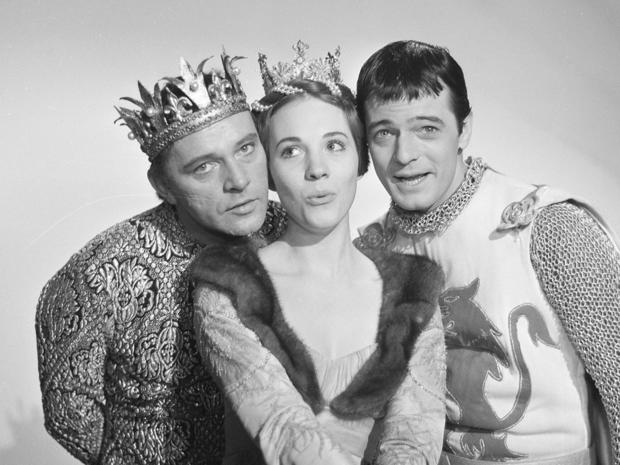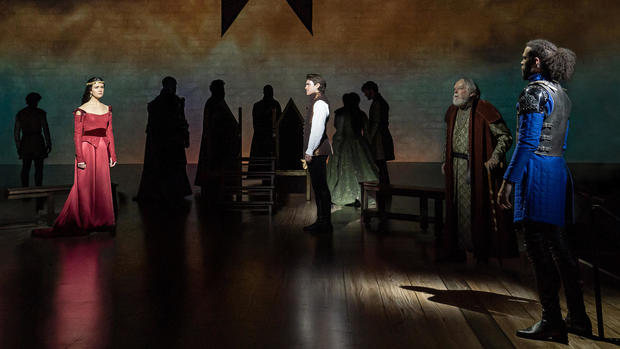Long before there was a Marvel Universe, before anyone had heard of Jedi Knights, there was King Arthur. The Arthur universe is more expansive than you may realize – movies, bestselling books, and one very beloved musical: Alan Jay Lerner and Frederick Loewe’s “Camelot.” Originally starring Richard Burton and Julie Andrews, it takes place in the legendary kingdom ruled over by Arthur.
CBS Photo Archive/Getty Images
But was there actually a King Arthur? “That is the million-dollar question,” said Dorsey Armstrong, an English professor at Purdue University and executive editor of the academic journal Arthuriana. “I think that the best we can say is that there was probably an Arthur-type figure around whom all these aspects of the legend coalesced over time.”
That figure would have lived some 1,500 years ago, after the Romans abandoned Britain, when the island was left vulnerable to attack. Legend has this hero rallied the native Britons to defend themselves, becoming a symbol of English identity.
“The story of Arthur seems to originate with a person who managed to create order out of chaos and did so in a positive way, that made people love him, want to serve him, want to follow him,” said Armstrong.
Stories about Arthur and his round table of knights evolved over the centuries. Arthur became the symbol of a benevolent ruler; his kingdom, Camelot, the symbol of a just society. No wonder then that Aaron Sorkin, the man behind TV’s “The West Wing,” that paean to good government, couldn’t resist bringing his own spin to Arthur’s story. The Oscar-winner adapted the script for the current Broadway revival of “Camelot.” “This version of Arthur, he grows up to be Martin Sheen on ‘The West Wing,'” he laughed.
Rocca asked, “Why this story now, though? Is there a reason to tell it now?”
Sorkin replied, “I think there is always a reason to tell it. We have been, for the last five, six years, waking up every morning as if there’s a gray cloud over us. I think that we want to be reminded that we are better than it seems like we are.”
Joan Marcus
In the musical, the kingdom comes undone when the knight Lancelot comes between Arthur and his queen, Guenevere – human passions undermining civic ideals. But in Sorkin’s version (which is up for five Tony Awards tonight), Guenevere is less of a trophy and more a political partner; and Arthur’s mentor Merlin is less magical, more mortal.
Merlin reminds our correspondent of another famous sage. He asked Sorkin, “Is Merlin Obi-Wan Kenobi?”
Sorkin sighed. “Okay, you can do with this what you like, Mo. But here is where I’m gonna get killed. I have never seen a ‘Star Wars’ movie. I know enough to know that Obi-Wan Kenobi is a character in ‘Star Wars,’ but I’ve never seen a ‘Star Wars’ movie. I have never seen a ‘Star Wars’ movie. I am sorry.”
Finding Camelot has never been easy; neither has staging a successful version of the musical. When it first opened, reviews were mixed.
Journalist Michael Lerner. the son of “Camelot” co-author Alan Jay Lerner, said, “It’s tricky, because it is a musical comedy at the beginning, but becomes a tragedy at the end – a tragedy with hope at the end. But that has always been the problem with ‘Camelot,’ making those two pieces work together.”
Then, in 1961, the stars appeared on Ed Sullivan’s show on CBS. “And overnight, the show became a huge success,” Lerner said.
Rocca asked, “What drew your father to this subject matter?”
“He was an idealist,” Lerner replied, “and I think he saw this play as a way of expressing some of that idealism through Arthur. This idea that Arthur was a link between barbarity and civilization was very appealing to him.”
But sadly, it was a barbaric act that would immortalize the show. After President John F. Kennedy was murdered, Jacqueline Kennedy told Life Magazine that her late husband listened to the cast album before going to bed each night.
Armstrong said, “I think that we cannot overstate the impact that not just the president’s assassination had on the story, but, more importantly, the fact that Jackie Kennedy chose to link those two things together. It was as if the idea of Camelot, a thing that had been great, that had reached for excellence and then had fallen short, was remembered, was mourned.”
Mournful, yes. But for Aaron Sorkin, also hopeful. When asked if he believed that Camelot was possible, he replied, “I do. I do. Honestly, who would want to wake up in the morning if they didn’t think that it was possible? And I think that quest for goodness, it turns out, it’s a fight against human nature. And you know, no matter how many times you try, no matter how many times you fail, keep trying.”
You can stream the 2023 Broadway cast recording of “Camelot” by clicking on the embed below (Free Spotify registration required to hear the tracks in full):
Watch The 76th Tony Awards presented live June 11 on CBS and Paramount+ beginning at 8 p.m. ET/5 p.m. PT; preshow on Pluto TV
2023 TONY AWARDS: Here are the nominees
For more info:
Story produced by Kay Lim. Editor: Steven Tyler.
See also:

